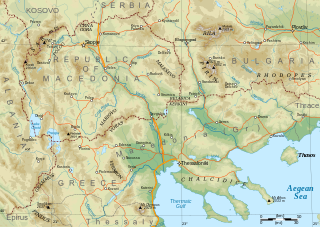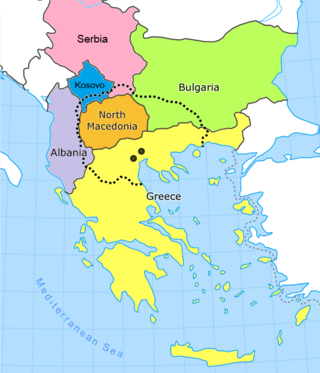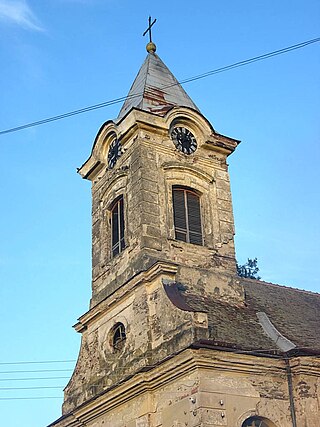There are several lists of Macedonians, people who live or lived in the region of Macedonia:

Macedonia is a geographical and historical region of the Balkan Peninsula in Southeast Europe. Its boundaries have changed considerably over time; however, it came to be defined as the modern geographical region by the mid-19th century. Today the region is considered to include parts of six Balkan countries: all of North Macedonia, large parts of Greece and Bulgaria, and smaller parts of Albania, Serbia, and Kosovo. It covers approximately 67,000 square kilometres (25,869 sq mi) and has a population of around five million. Greek Macedonia comprises about half of Macedonia's area and population.
The history of North Macedonia encompasses the history of the territory of the modern state of North Macedonia.
Brest most commonly refers to:
This is a list of notable persons by nationality.
The Megleno-Romanians, also known as Meglenites, Moglenite Vlachs or simply Vlachs, are an Eastern Romance ethnic group, originally inhabiting seven villages in the Moglena region spanning the Pella and Kilkis regional units of Central Macedonia, Greece, and one village, Huma, across the border in North Macedonia. These people live in an area of approximately 300 km2 in size. Unlike the Aromanians, the other Romance-speaking population in the same historic region, the Megleno-Romanians are traditionally sedentary agriculturalists, and not traditionally transhumants. Sometimes, the Megleno-Romanians are referred as "Macedo-Romanians" together with the Aromanians.
Macedonian most often refers to someone or something from or related to Macedonia.

The Rainbow is a political party in Greece, and a member of the European Free Alliance. It is known for its activism amongst what it regards as the ethnic Macedonian minority in Greece and their descendants abroad. The Rainbow states that it sees the acceptance of the Republic of North Macedonia in the European Union with a positive regard.

Macedonians are a nation and a South Slavic ethnic group native to the region of Macedonia in Southeast Europe. They speak Macedonian, a South Slavic language. The large majority of Macedonians identify as Eastern Orthodox Christians, who share a cultural and historical "Orthodox Byzantine–Slavic heritage" with their neighbours. About two-thirds of all ethnic Macedonians live in North Macedonia and there are also communities in a number of other countries.

Macedonia most commonly refers to:

Macedonia is a geographic and former administrative region of Greece, in the southern Balkans. Macedonia is the largest and second-most-populous geographic region in Greece, with a population of 2.36 million. It is highly mountainous, with major urban centres such as Thessaloniki and Kavala being concentrated on its southern coastline. Together with Thrace, along with Thessaly and Epirus occasionally, it is part of Northern Greece. Greek Macedonia encompasses entirely the southern part of the wider region of Macedonia, making up 51% of the total area of that region. Additionally, it widely constitutes Greece's borders with three countries: Albania to the northwest, North Macedonia to the north, and Bulgaria to the northeast.

Gudurica is a village in Serbia. It is situated in the Vršac municipality, in the South Banat District, Vojvodina province. The village has a Serb ethnic majority (66.21%) and a sizable ethnic Macedonian minority (10.49%), and its population numbering 1,092 people. Part of the Macedonians of Gudurica are in fact assimilated Aromanians and specially Megleno-Romanians that came to the village from the Macedonian SR it following the expulsion of its native German population.

Orders, decorations, and medals of the Socialist Federal Republic of Yugoslavia were created during the Second World War and used throughout the existence of the Socialist Federal Republic of Yugoslavia. The first decorations were created by AVNOJ on August 15, 1943 and included the Order of the People's Hero, Order of the People's Liberation, Order of the Partisan Star, Order of the Brotherhood and Unity, Order for Bravery and Medal for Bravery. By 1960 the total number of decorations increased to 42 and consisted of 35 orders, 6 medals and 1 commemorative medal. The designers of the Yugoslav orders and medals were Antun Augustinčić and Đorđe Andrejević Kun.

Mekitsa is a traditional Bulgarian dish made of kneaded dough made with yogurt that is deep fried. They are made with flour, eggs, yogurt, a leavening agent, water, salt, and oil. In Serbia they are called mekike, while in Macedonian mekica or pituljica, and in Bulgaria mekitsa. They are similar to Hungarian lángos and British Yorkshire pudding. Mekitsa is conventionally a breakfast dish.

Macedonians or Macedonian Bulgarians, sometimes also referred to as Macedono-Bulgarians, Macedo-Bulgarians, or Bulgaro-Macedonians are a regional, ethnographic group of ethnic Bulgarians, inhabiting or originating from the region of Macedonia. Today, the larger part of this population is concentrated in Blagoevgrad Province but much is spread across the whole of Bulgaria and the diaspora.

North Macedonia, officially the Republic of North Macedonia, is a landlocked country in Southeast Europe. It shares land borders with Greece to the south, Albania to the west, Bulgaria to the east, Kosovo to the northwest and Serbia to the north. It constitutes approximately the northern third of the larger geographical region of Macedonia. Skopje, the capital and largest city, is home to a quarter of the country's 1.83 million people population. The majority of the residents are ethnic Macedonians, a South Slavic people. Albanians form a significant minority at around 25%, followed by Turks, Roma, Serbs, Bosniaks, Aromanians and a few other minorities.

Israel–North Macedonia relations refer to the bilateral political relations between Israel and North Macedonia. North Macedonia has an embassy in Tel Aviv. Israel does not have a resident ambassador.
Macedonian onomastics is part of Macedonian studies that studies names, surnames, and nicknames in Macedonian. This is a relatively new linguistic discipline. In Macedonia, and in Macedonian studies in general, it developed during the 19th century, when the first few research results have been provided. The onomastics for a long period of time has been considered as part of various scientific disciplines, such as geography, history or ethnography, until it became a discipline on its own in the 20th century. Macedonian onomastics, generally speaking, is divided into toponomastics and anthroponomastics.

Vasil Garvanliev is a Macedonian singer. He is also known mononymously as Vasil. He was due to represent North Macedonia with the song "You" in the Eurovision Song Contest 2020 in Rotterdam before the event was cancelled. Instead, he represented North Macedonia in the 2021 contest, this time with the song "Here I Stand".